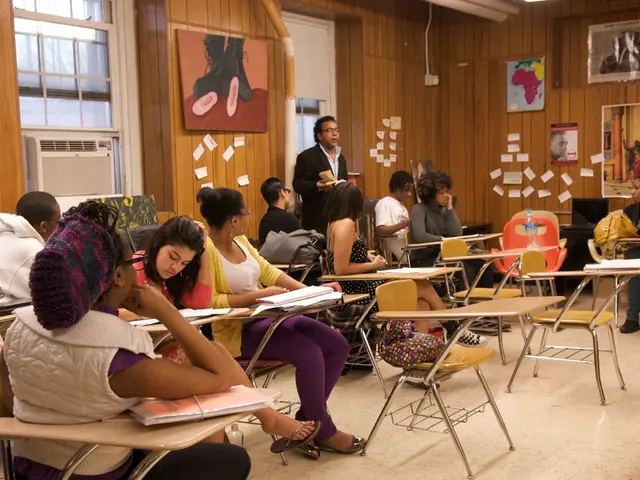Outdoor Learning Frameworks That Ignite Awe and Curiosity in Nature
In a groundbreaking shift, nature-based learning frameworks are revolutionising the educational landscape, integrating academic learning with personal and environmental development. These innovative approaches offer a holistic solution that nurtures ecological literacy, scientific inquiry skills, physical capabilities, social interactions, and emotional resilience.
At the heart of nature-based learning lies direct experience with nature, providing students with opportunities to explore and interact with natural environments. This hands-on approach fosters a deeper understanding of the natural world and its complexities, promoting child-centred learning and encouraging creativity, independence, and critical thinking.
The long-term process of engaging children with the same natural environment over time allows them to observe seasonal changes and develop a thorough understanding of natural cycles. This holistic development approach balances academic achievement with physical and mental well-being, leading to a well-rounded education.
Nature-based learning boasts numerous benefits. Academically, it has been linked to improved academic performance as it enhances concentration and engagement. Creativity and critical thinking skills are also fostered, essential for problem-solving. Time spent in nature is associated with better physical health and mental well-being, including reduced stress and improved mood.
Moreover, nature-based learning promotes environmental awareness and appreciation, encouraging responsible stewardship of natural resources. Participating in nature-based activities can improve social skills, confidence, and emotional resilience.
Program effectiveness in nature-based education can be measured through various methods, including parent surveys, teacher observations, community feedback forms, student attendance, engagement levels, and participation in environmental projects.
Educators must complete specialized training in outdoor education safety protocols, wilderness first aid, child development, and environmental education fundamentals. The future of nature-based learning includes technology integration, urban nature education solutions, policy and standards development, and a focus on equity.
Urban schools can adopt innovative approaches to nature-based learning through vertical gardens, rooftop ecosystems, pocket parks, and mobile nature labs. Creating outdoor learning environments should include diverse natural elements that support hands-on exploration, designated zones for different activities, and weather-appropriate shelters.
Technology integration in nature-based learning can be achieved through augmented reality (AR) nature exploration apps, interactive field guides, environmental monitoring devices, and virtual reality (VR) platforms. Developing nature-focused curriculum should integrate core academic subjects with natural phenomena, plan lessons that combine math concepts with counting natural objects, and include regular unstructured exploration time.
A successful nature-based learning program requires careful attention to risk assessment and management, parent and community engagement, and assessment and documentation methods. Nature-based learning frameworks integrate outdoor environments with structured learning experiences to create meaningful educational opportunities.
Outdoor learning environments foster social-emotional growth by promoting collaboration, communication, resilience, and empathy development. Innovative initiatives like Nature Kindergarten place outdoor exploration at the core of early childhood education, with children spending 80-100% of their school day outdoors.
Evaluating the effectiveness of nature-based education requires unique assessment approaches that align with its experiential and holistic learning principles. Place-based education connects learning directly to the local environment, community, and culture. Safety in nature-based learning can be ensured through comprehensive risk-benefit assessments, clear protocols, staff training, appropriate student-to-teacher ratios, and established boundaries for exploration areas.
Weather challenges in outdoor learning can be addressed by creating a flexible schedule, designating indoor spaces with natural elements, and investing in appropriate gear. New educational policies are evolving to recognise nature-based learning as a crucial component of modern education, with a focus on equity and the development of specific outdoor learning standards, assessment frameworks, and teacher certification requirements.
Forest School learning, originating in Scandinavia, focuses on developing confidence, resilience, and social skills through hands-on activities like building shelters and learning primitive skills. Regular outdoor learning activities boost physical health, improving gross motor skills, increasing physical activity levels, and supporting healthy circadian rhythms and vitamin D production.
In conclusion, nature-based learning offers a transformative approach to education, integrating academic learning with personal and environmental development. By embracing these frameworks, we can equip students with the skills they need to thrive in the 21st century while fostering a deeper connection with the natural world.
In the realm of education and self-development, e-learning platforms can be complemented with nature-based learning, fostering lifestyles that promote a holistic approach to learning. This integration would not only enhance academic performance but also nurture ecological literacy, creativity, critical thinking, and physical and mental well-being.
Urban schools, leveraging technology, can create innovative nature-based learning environments, integrating outdoor spaces with rooftop ecosystems, vertical gardens, and mobile nature labs. These settings would encourage child-centered learning, embodying the principles of the e-learning environment within a natural context, thus leading to a well-rounded education.




